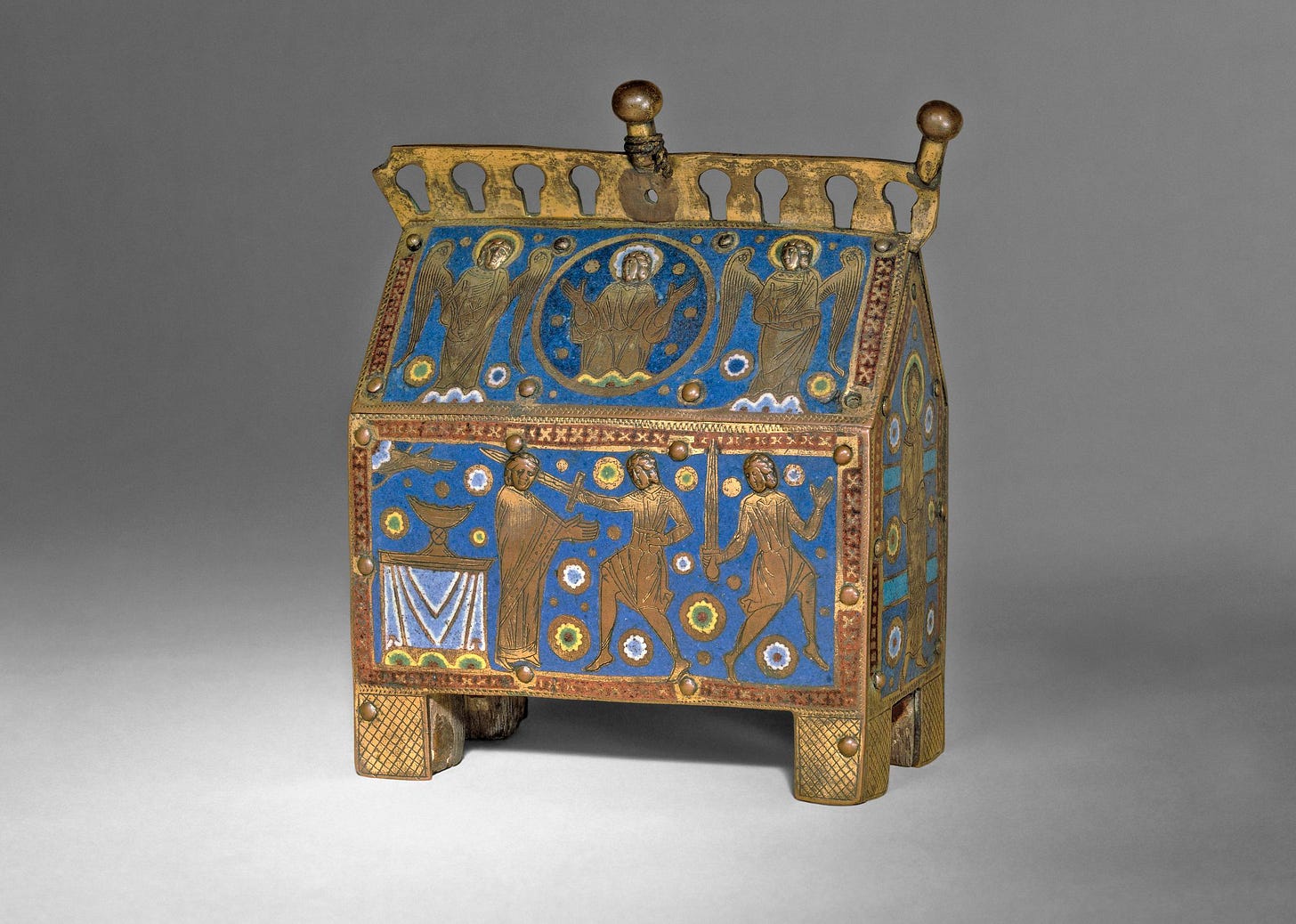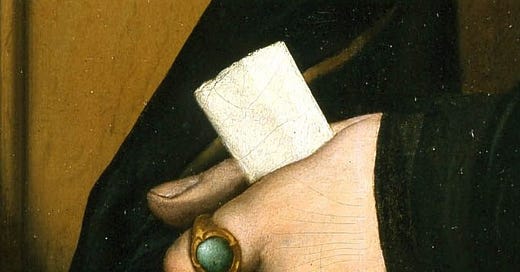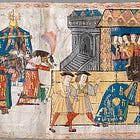I love how a well-written historical novel can challenge my assumptions about what is ‘normal’ or ‘obvious’, briefly immersing me in a world where my own culturally-shaped expectations don't apply. This is particularly true of the way that the relationship between religion and the supernatural is portrayed in the Wolf Hall trilogy.
Wolsey's powers
Soon after our read-along began, I found myself drawn to passages that touched on the shifts and overlaps between religion and magic, starting with this description of Wolsey's procession north:
"People from all over the countryside flock to him, ambushing him at wayside crosses so that he can lay his magical hands on their children; they call it 'confirmation', but it seems to be some older sacrament."
When I first made a note of this, I put it under the heading ‘superstition’ - but on reflection, this doesn't feel right. Nowhere in this description does it say that the people's beliefs are foolish, or that the cardinal's touch will have no effect; those are my preconceptions. What’s actually being brought to our attention seems to be a difference of opinion about the nature of the cardinal's power, not whether it exists. After all, the idea of healing touch was commonly accepted at the time - as I mentioned in my previous post, Henry VIII himself claimed the divine gift of healing, and took part in rituals to lay his hands on people with scrofula.
I've just been re-reading Keith Thomas's classic Religion and the Decline of Magic1, and found the concept of ‘ecclesiastical magic’ illuminating:
“Certain supernatural effects could be confidently expected by faithful men who followed the rituals prescribed by God and the Church, for example those pertaining to the Mass or the power of Holy water. Others might occur miraculously, as with the healing activities of the saints. But the remainder were diabolical and to be abhorred.”
What's notable here is that whether divine or satanic, these supernatural effects were seen as genuine. When Wolsey's enemies hinted at witchcraft, they were talking about something real and frightening:
“Those who envy the cardinal say he has a ring which enables its owner to fly, and allows him to encompass the death of his enemies. It detects poisons, renders ferocious beasts harmless, ensures the favour of princes, and protects against drowning.”
Later, Cromwell wears this same ring, and Lady Mary's attendant Grace Bedingfield repeats similar claims about its powers: “‘Melts stone walls, makes princesses fall in love with you?’” Thomas's book confirms that rumours about both Wolsey and Cromwell using magic rings to gain the king’s favour really did circulate at the time.
Norfolk’s relics
Through Wolsey, Mantel shows us the widespread appeal of pre-Reformation church ‘magic’, for example when people believe that his prayers might alter the weather to ensure a good harvest, or local children advise Cromwell to ask the cardinal for a protective medal or relic. The Duke of Norfolk, on the other hand, is presented as a figure of fun:
“indeed he rattles a little as he moves, for his clothes conceal relics: in tiny jeweled cases he has shavings of skin and snippets of hair, and set into medallions he wears splinters of martyrs’ bones.”
As one of the oldest characters in the books, he can be seen as a hangover from a former time, a superstitious caricature of the traditional approach to religion. We're told that despite his faith in their powers, he tends to mix up the saints that he calls upon for help. His niece Anne Boleyn is described in contrasting terms, as a keen Bible-reader who “laughs at his holy medals and the relics he wears, some of them very sacred.”

Hocus pocus
Norfolk’s beliefs do not seem to be disturbed by the break with Rome - he still brings an unwell Cromwell a medal blessed by the pope! - but in Cromwell's household, things are shifting, and the powers of the church are being questioned. Cromwell is unimpressed when his nieces ask him to use his influence with the cardinal to try to have his dead wife released from purgatory:
“Dear God, what is going on under this roof? These children believe the Pope can go down to the underworld with a bunch of keys.”
In Religion and the Decline of Magic, this rejection of what Cromwell and his allies might see as popish superstition is summed up nicely:
“The Reformation in England saw a spectacular reduction of the power attributed to holy words and objects, so that the more extreme Protestants virtually denied the existence of any Church magic at all.”
This view is well represented in Wolf Hall. Cromwell’s Bible-reading friends are beginning to dismiss as invalid any claim of the church that does not have a basis in scripture. Little Bilney, the priest who is later burned by More, declares, “‘Masses, fasting, vigils, pardons out of Purgatory … all useless’”.
At John Petyt’s funeral, Cromwell laughs when he hears of a church service where the congregation mockingly chanted ‘hoc est corpus, hocus pocus’ at the priest. His mother in law Mercy, who he suspects was raised in a Lollard family, shares this attitude:
“‘When the good Lord said, this is my body, he meant, this signifies my body. He did not license priests to be conjurers.’”
Cromwell’s own views on the power of holy items appear more convincing to me because they are shown as changing with the times. Early in his career, when charges are being brought against Wolsey and Cromwell feels himself threatened, he still instinctively reaches for “the holy medal that Kat gave him” and realises that he only cast it into the sea “so that no living hand could take it”. But by the time we see him receiving boxes of confiscated relics in 1535, he makes cynical claims about their origins:
“Now, what did they want at Westminster Abbey, with the remains of an elephant? If not to carve a ton of relics out of him, and make his animal bones into the bones of saints.”
(There really was an elephant at the Tower of London in the 13th century2, and it really was dug up and moved to Westminster Abbey, but the reason why does not appear to be known. I love this example of Mantel taking a true historical event and using it to give depth to her setting while showing us what Cromwell believes.)
It's clear that in Tudor society, the supernatural felt real, and entwined with religion, in a way that feels alien to many modern readers. However, one of the things that makes Mantel’s Cromwell trilogy so compelling for me is that it takes us to the heart of the action at a time of dramatic change, and shows characters with widely varying perspectives.
A time when Anne can be queen, and Cromwell can be Cromwell, is also a time when long-held beliefs can be questioned. The irony is that it is the traditionalist Duke of Norfolk who clings to supernatural talismans, but the accusations of witchcraft are targeted at those who refute such beliefs but challenge the social order by rising above their station, such as Cromwell himself3. After all, “how else but by being a sorcerer would he get the reins of power in his hand?”
There aren't many 700+ page history texts that I find myself wanting to revisit from my student days, but this is one that I still find myself quoting in casual conversation decades later, so I decided to pick it up again & see how accurate my memories of it were…
As we're seeing in our current reading, this applies even more strongly to Anne Boleyn. I will try to look into Anne's ‘witchcraft’ more closely in a future post, since this one took on a life of its own and decided it wanted to have a different emphasis.





